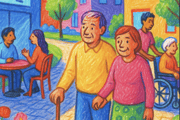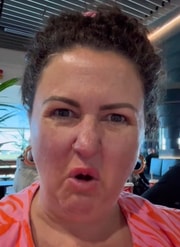Should terminally ill young people be able to choose voluntary assisted dying? The ACT is considering it
- Replies 3
The ACT Labor-Greens government is currently considering legalising voluntary assisted dying, as has recently occurred in all six Australian states. But the results of community consultation on the topic suggest the ACT’s proposed legislation may differ in significant respects from the model adopted by other Australian states and territories.
One controversial difference is the proposal to allow people under 18 to access voluntary assisted dying if they have a terminal illness.
The ACT proposes not setting a minimum age requirement for access to voluntary assisted dying. Instead, as is the case with other areas of medical treatment, the decision-making capacity of people under the age of 18 would be assessed on a case-by-case basis by medical practitioners.
If they are assessed as having the maturity to understand the nature of their medical condition, and the nature of a decision to seek assistance to end their life, they would be able to be considered for voluntary assisted dying.
However, it has already elicited impassioned commentary, debate and expressions of concern.
If passed, the ACT would become the first Australian jurisdiction to allow access to voluntary assisted dying by people under 18.
Internationally, only three countries – the Netherlands, Belgium and Colombia – permit minors to access voluntary assisted dying or euthanasia. Canada is currently considering a proposalto expand its assisted dying law to “mature minors” deemed to have decision-making capacity.
Young people, just like adults, may also be suffering intolerably from an incurable terminal illness. Age limits are only an approximation of a person’s capacity to make one’s own decisions in important matters of life and death.
However, the absence of age limits can also lead to significant variations in access, depending on the views of the medical practitioners involved in making the decision as to a young person’s capacity.
In Belgium, where no minimum age is stipulated (provided children understand the decision they are making), children as young as 9 and 11 have been granted access to euthanasia.
In the Netherlands, children must be aged 12 or over to request euthanasia. In Colombia, in most cases a child must be aged 12 or over, although in extraordinary cases children aged between 6 and 12 may demonstrate “exceptional neurocognitive and psychological development” and an advanced concept of death appropriate for a 12-year-old child.

Parental consent is required in addition to the child’s consent for all children in Belgium (except emancipated minors), and for children aged under 16 in the Netherlands and under 14 in Colombia.
For children aged 16 to 17 in the Netherlands, and 14 to 17 in Colombia, parents are informed and consulted about the young person’s decision. But ultimately the decision is that of the child.
If the ACT proceeds down this path, legislation will need to address difficult questions, including whose wishes prevail if a young person and their parents are in conflict.
Some jurisdictions, including Belgium and Columbia, require extra consultations above those required for adults, to confirm a young person’s capacity to make the decision to end their life.
Other supports may include access to child and family counselling throughout the voluntary assisted dying request and assessment process, or independent review of the child’s eligibility assessment.
In Belgium, only four children are reported to have accessed euthanasia in nine years. In the Netherlands, 17 cases have been reported over a 20-year period. Although cases of terminally ill young people seeking access to VAD are likely to be exceptional, they will occasionally arise.
The proposal not to specify a timeframe to death will open the door for people diagnosed with a terminal illness to seek voluntary assisted death several years before their anticipated passing. In other countries, such as Canada, this has been interpreted to allow people to access voluntary assisted dying in the early stages of dementia, before a person loses capacity.
Another proposal with far-reaching ramifications is whether a request for voluntary assisted dying can be made in an advance directive. If enacted, this would allow for the euthanasia of a person with advanced dementia, in compliance with their previous request.
A bill is likely to be introduced in late 2023. It will then be considered by a parliamentary committee, before being debated in the ACT Legislative Assembly some time next year. That gives the ACT government time to consider what safeguards and supports should be included if children or young people are to be permitted to access voluntary assisted dying there.
This article was first published on The Conversation, and was written by Katrine Del Villar, Postdoctoral research fellow, Queensland University of Technology
One controversial difference is the proposal to allow people under 18 to access voluntary assisted dying if they have a terminal illness.
The ACT proposes not setting a minimum age requirement for access to voluntary assisted dying. Instead, as is the case with other areas of medical treatment, the decision-making capacity of people under the age of 18 would be assessed on a case-by-case basis by medical practitioners.
If they are assessed as having the maturity to understand the nature of their medical condition, and the nature of a decision to seek assistance to end their life, they would be able to be considered for voluntary assisted dying.
ACT could be the first
There appears to be some support within the ACT for this proposal. In a survey of almost 3,000 ACT residents conducted in February this year, some 32% of respondents supported a minimum age of 18 for people to be able to access voluntary assisted dying – suggesting the majority don’t see it as required.However, it has already elicited impassioned commentary, debate and expressions of concern.
If passed, the ACT would become the first Australian jurisdiction to allow access to voluntary assisted dying by people under 18.
Internationally, only three countries – the Netherlands, Belgium and Colombia – permit minors to access voluntary assisted dying or euthanasia. Canada is currently considering a proposalto expand its assisted dying law to “mature minors” deemed to have decision-making capacity.
Suffering doesn’t discriminate by age
During community consultation, many ACT residents felt an age requirement would be arbitrary.Young people, just like adults, may also be suffering intolerably from an incurable terminal illness. Age limits are only an approximation of a person’s capacity to make one’s own decisions in important matters of life and death.
However, the absence of age limits can also lead to significant variations in access, depending on the views of the medical practitioners involved in making the decision as to a young person’s capacity.
In Belgium, where no minimum age is stipulated (provided children understand the decision they are making), children as young as 9 and 11 have been granted access to euthanasia.
In the Netherlands, children must be aged 12 or over to request euthanasia. In Colombia, in most cases a child must be aged 12 or over, although in extraordinary cases children aged between 6 and 12 may demonstrate “exceptional neurocognitive and psychological development” and an advanced concept of death appropriate for a 12-year-old child.

The ACT would be the first Australian place to approve voluntary assisted dying for minors. Shutterstock
Checks and balances required
The ACT government noted allowing young people to access voluntary assisted dying requires extra safeguards to balance the autonomous rights of young people against their right to special protection and the rights of families.Parental consent is required in addition to the child’s consent for all children in Belgium (except emancipated minors), and for children aged under 16 in the Netherlands and under 14 in Colombia.
For children aged 16 to 17 in the Netherlands, and 14 to 17 in Colombia, parents are informed and consulted about the young person’s decision. But ultimately the decision is that of the child.
If the ACT proceeds down this path, legislation will need to address difficult questions, including whose wishes prevail if a young person and their parents are in conflict.
Some jurisdictions, including Belgium and Columbia, require extra consultations above those required for adults, to confirm a young person’s capacity to make the decision to end their life.
Other supports may include access to child and family counselling throughout the voluntary assisted dying request and assessment process, or independent review of the child’s eligibility assessment.
How many young people could choose voluntary assisted dying?
There is not likely to be a great need for young people to access voluntary assisted dying in the ACT.In Belgium, only four children are reported to have accessed euthanasia in nine years. In the Netherlands, 17 cases have been reported over a 20-year period. Although cases of terminally ill young people seeking access to VAD are likely to be exceptional, they will occasionally arise.
How else could ACT laws be different?
Some other departures from the Australian model proposed by the ACT government are likely to have a far greater impact than the inclusion of minors.The proposal not to specify a timeframe to death will open the door for people diagnosed with a terminal illness to seek voluntary assisted death several years before their anticipated passing. In other countries, such as Canada, this has been interpreted to allow people to access voluntary assisted dying in the early stages of dementia, before a person loses capacity.
Another proposal with far-reaching ramifications is whether a request for voluntary assisted dying can be made in an advance directive. If enacted, this would allow for the euthanasia of a person with advanced dementia, in compliance with their previous request.
Under consideration
At this stage, these proposals simply summarise the views of the ACT community. The next step is for the ACT government to develop its preferred model law to legalise voluntary assisted dying in the territory.A bill is likely to be introduced in late 2023. It will then be considered by a parliamentary committee, before being debated in the ACT Legislative Assembly some time next year. That gives the ACT government time to consider what safeguards and supports should be included if children or young people are to be permitted to access voluntary assisted dying there.
This article was first published on The Conversation, and was written by Katrine Del Villar, Postdoctoral research fellow, Queensland University of Technology






